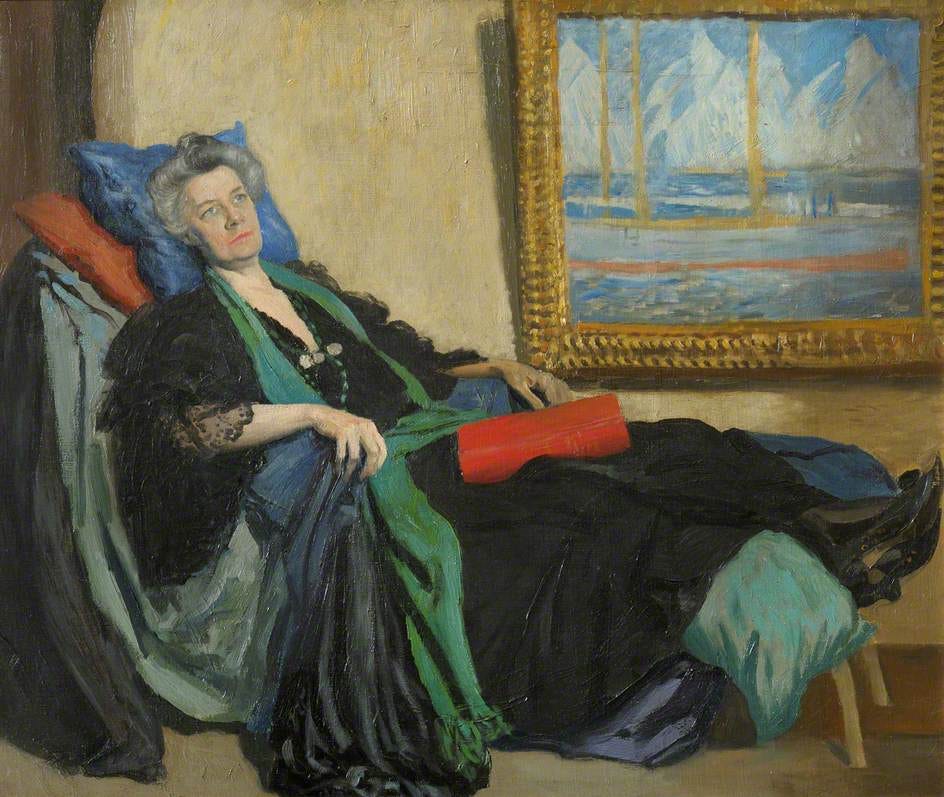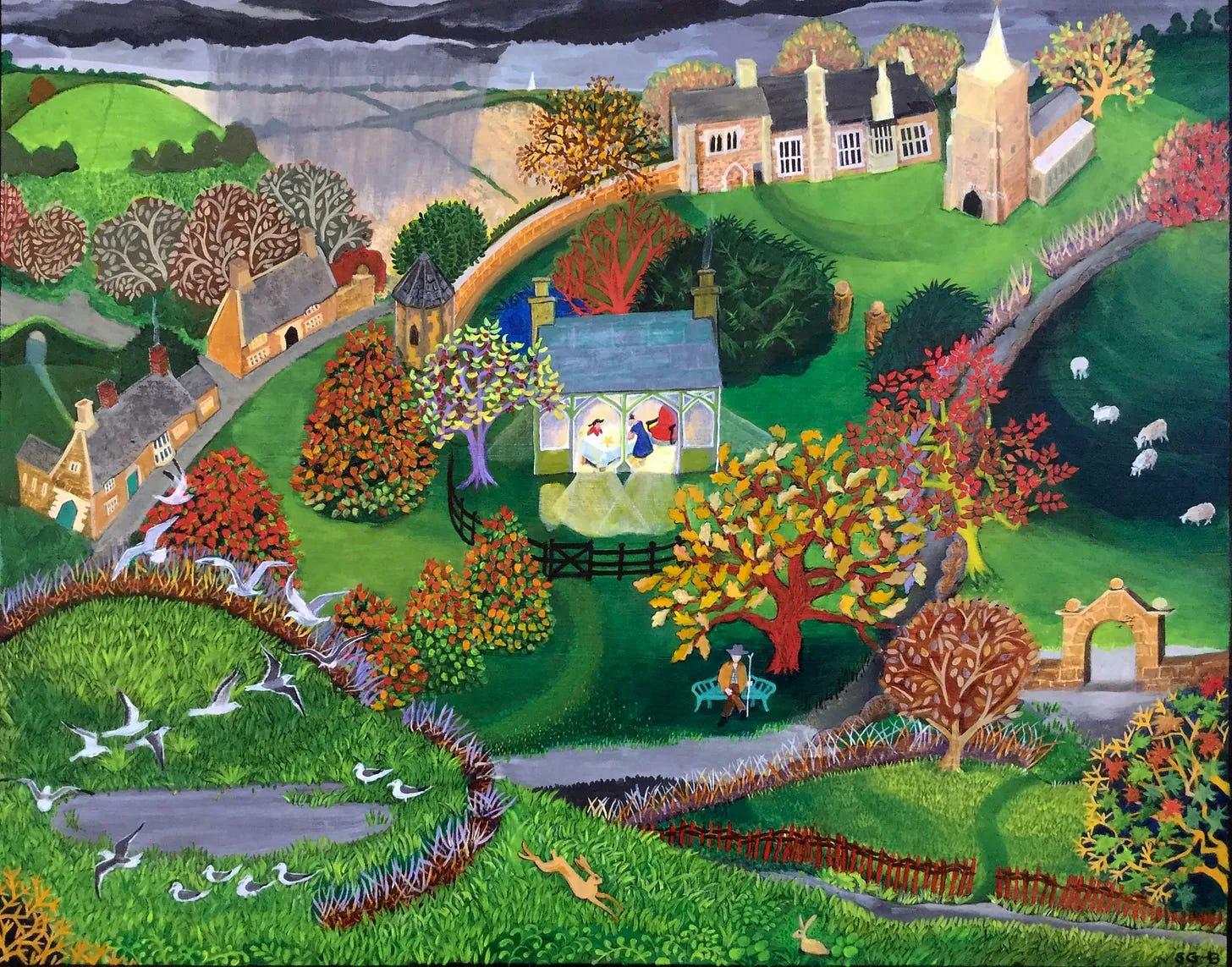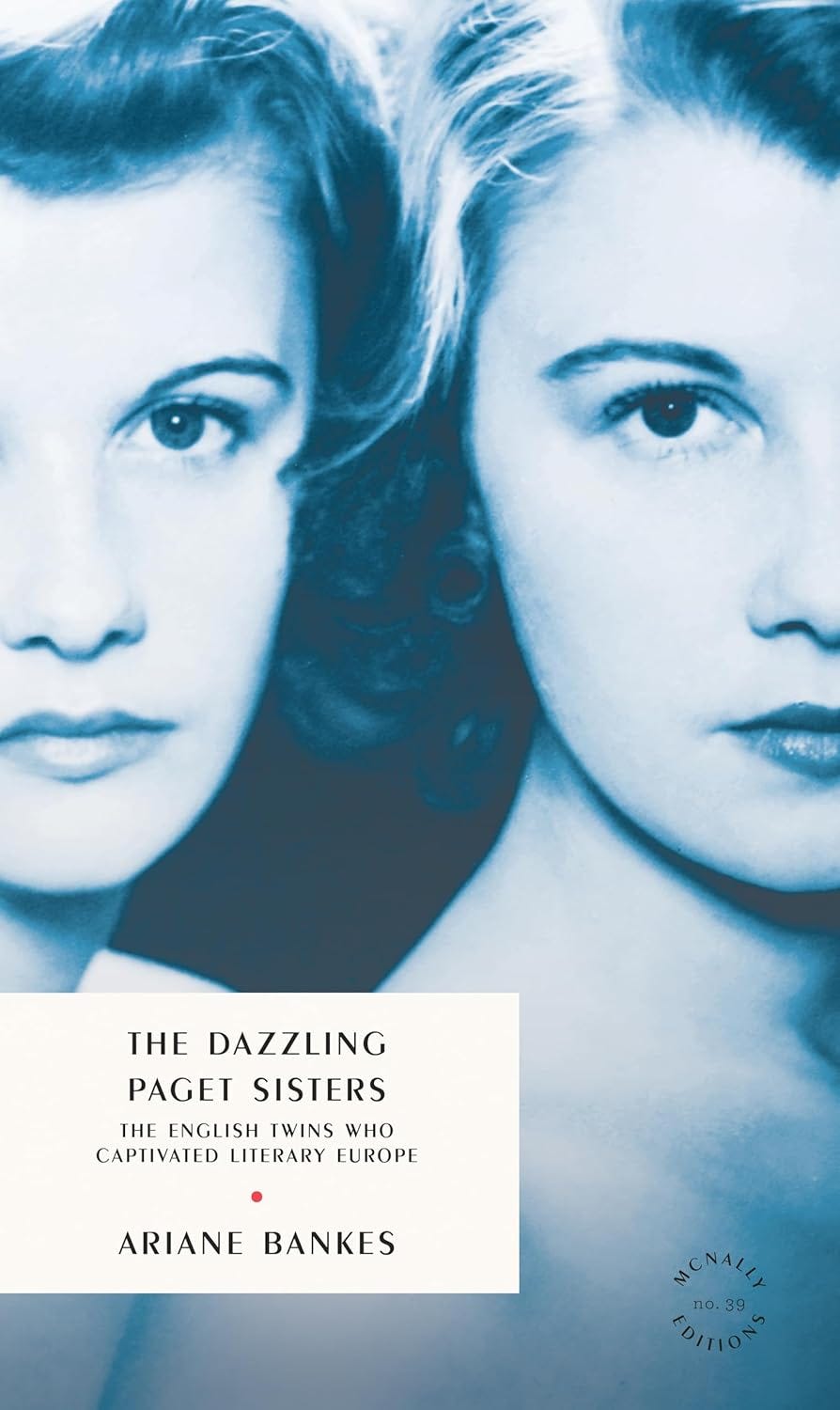Portrait of Jane Harrison
Summer heat, cool nonfiction and the legendary Jane Ellen Harrison

Hello! Welcome to the latest post from Cambridge Ladies’ Dining Society. Thank you very much to everyone who joined recently as a paying subscriber and/or commented on my introduction to Gaudy Night by Dorothy L. Sayers last week. It’s fantastic to have your support, and I have been blown away by how much people love this novel (‘I first read Gaudy Night in my twenties, and have re-read it many times over the decades since, finding more to love in it each time’: Terri). Part 2 follows soon. This week’s post is about the Cambridge scholar who features in the portrait above, plus a round-up of recent Substacks and some recommended books for summer and autumn. Thanks for reading!
Jane Ellen Harrison (1850-1928)
It’s been hot, hot, hot in the east of England over the past few weeks. There’s a tendency among some of us to complain fervently during a heatwave (June and July have been torrid), but soon, I guess, we’ll be sighing that summer’s lease has all too short a date. The image above is a portrait of an author who certainly didn’t swoon on her chaise longue because of the heat, but rather because it was the best place for her to think, and talk. Dr Jane Ellen Harrison was a classical scholar whose lectures and books, including Prolegomena to the Study of Greek Religion (1903), inspired Virginia Woolf among many others. T.S. Eliot said ‘Few books are more fascinating than those of Miss Harrison... when they burrow in the origins of Greek myths and rites,’ and Woolf would pay tribute to her lifelong influence in her feminist essay A Room of One’s Own (1929).
‘I’d give ten years of my life to know Greek,’ says Clarissa Dalloway in Virginia Woolf’s first published novel, The Voyage Out (1915)
In the summer of 1909, when Augustus John was commissioned to paint her portrait, Jane Harrison was a Fellow of Newnham College, Cambridge. It was, on the face of it, a strange combination: the bohemian artist, who arrived by horse-drawn caravan and camped with his large family retinue on Grantchester Meadows for four weeks, and the seemingly austere Cambridge classicist. In fact the two of them got on ‘famously well’, as biographer Judith Mackrell writes in her new book, Artists, Siblings, Visionaries: The Lives and Loves of Gwen and Augustus John (Pan Macmillan, 2025). Harrison chain-smoked her way through the sittings and chatted and joked with her classicist friend, Gilbert Murray.
In the resulting painting, Augustus John gives weight to her academic authority, showing the intelligent lines of her face and the heavy book on her lap, but he also captures Harrison’s freedom of spirit and, as Mackrell puts it, her ‘colourful dishevelment as she lay on her couch, one shoe half kicked-off to reveal the darning on the heel of her stocking.’1 In the background is her beloved painting, ‘A Procession of Yachts’ by Philip Wilson Steer, Augustus John’s mentor and former tutor at the Slade School of Art. Harrison loved the resulting portrait. ‘I look like a fine distinguished prize fighter who has had a vision and collapsed under it’ she told a friend,2 ‘it seems to me beautiful.’
I was delighted to give a talk about Jane Ellen Harrison last week for the online version of
’s summer course ‘Virginia Woolf: Writing Life’ (the in-person version takes place in Cambridge, UK on 20-25 July). I’ll be writing a longer piece about Harrison here on Substack, as part of my forthcoming series on Cambridge women.Culture picks this month
Joyeux 14 Juillet, to those who celebrate, and bravo! for the Bayeux Tapestry. It’s coming home, writes historian
of the forthcoming, much-anticipated exhibition of the world’s most famous medieval tapestry in the British Museum in London.There’s been a lot of kerfuffle in the book world recently about Raynor Winn’s bestselling memoir The Salt Path. Literary critic
offers sensible advice, and excellent suggestions of other books to restore your faith in the genre. ‘This one case does not mean that we suddenly have reason to doubt the narratives of the many other “redemptive journey” memoirs that have captivated, entertained, moved and comforted readers,’ she writes here.I’m very pleased to have been introduced to the forgotten German-Jewish artist Käthe Schuftan (1899-1958) in this post by biographer
. Schuftan ‘arrived in Manchester in June 1939 after suffering greatly at the hands of the Nazis and having had much of her work destroyed’ Yohannen writes. ‘She became an important figure in the artistic community of Manchester, teaching and inspiring young artists and exhibiting her work.’- ’s new Substack is called ‘Paintings from the kitchen table’ and features glimpses of the English rural scenes that inspire her beautiful work (see link below). Her gently humorous writing reminds me of Ronald Blythe’s ‘Word from Wormingford’ columns for the Church Times. ‘On the way I bumped into a friend from the village walking her dog,’ she writes. ‘“Hot!” I said. “Yes,” she said, “hotter than Satan’s armpit!” I couldn’t disagree.’ Highly recommended.

Summer reading recommendations abound here on Substack, from
’s delightful ‘Summer with the Elizabeths’ to ’s Absorbing novels to read on holiday, ’s ‘Summer reading for 2025’, ‘Substantive Summer Reading’ and ’s ‘midsummer mostly-mystery miscellany’. I also enjoyed ’s take on how authors write (rather than complain) in hot weather, here.Novelist
is new to this parish with a wonderful Substack called ‘Notes of Cheer’. She has compiled a ‘most excellent’ list of 1920s-40s novels, and it’s well worth a look.And finally, if you’re already missing the tennis in the UK (or elsewhere), do treat yourself to Wimbledon, unstacked, from
and enjoy those super-sized strawberries in the shade somewhere.
Nonfiction round-up
Here are some of the newly published books and paperbacks I’m looking forward to reading this summer and autumn.
Born by Lucy Inglis (Bloomsbury Continuum UK; 28 August 2025) is ‘a global history of how we are born’ and promises to be an excellent companion to the newly published The Good Mother Myth (St Martin’s Press, New York) by
. She is sceptical of 20th-century parenting ‘experts’: ‘Some men really will invent an entire academic discipline instead of going to therapy’.A Year with Gilbert White by award-winning Jenny Uglow (Faber UK; September 2025) In her new book, Uglow considers a single year (1781) in White’s naturalist’s journal: from frost to summer drought and bird migration to the coming of the harvest. I love all of Uglow’s biographies but especially her Nature’s Engraver: A Life of Thomas Bewick (2006) so this is sure to be as evocative.
Judith Mackrell’s dual biography Artists, Siblings, Visionaries: The Lives and Loves of Gwen and Augustus John (Pan Macmillan UK, June 2025): ‘Mackrell goes far beyond a simplistic schema in mapping these lives. Gus is not a pantomime patriarchal villain, nor Gwen a feminist idol: they’re human.’ (Jonathan Jones, The Guardian, 9 June 2025)
Serve: My Lost Years at the Heart of Ireland’s Opus Dei by Anne-Marie Allen (Gill Books, Ireland; June 2025). It’s a difficult subject, but Allen’s memoir tells the important story of how young Irish girls like her were, as recently as the 1980s, promised vocational training by this powerful and secretive organization, but instead found themselves trapped in a life of domestic servitude.
Look out for the paperback of The Quality of Love: Twin Sisters at the Heart of the Century by Ariane Bankes (Duckworth UK, September 2025); in the USA it’s called The Dazzling Paget Sisters (McNally, 2025). This has been one of my favourite books this year: a thoroughly enjoyable and poignant slice of social history.
Thank you very much for reading, and before you go, I would love to know…
1. About any books that you have enjoyed reading recently.
2. Do you have your eye on certain novels or nonfiction for your summer holiday? Do you prefer old favourites or go for something brand new?
Mackrell, p. 195-6.
Quoted in Mackrell, p. 196. See also Newnham College Cambridge, ‘Portraits: Paintings, drawings and photographs’, accessed 14 July 2025.




I'm reading (and writing about) the Pulitzer Prize winners from the Novel/Fiction category. I've found one author that I want to read every single word she ever wrote (Edith Wharton), plus a few other authors that were enjoyable and completely unknown to me. I love discovering new authors - one of the many reasons your work is so appreciated!
Thank you so much, Ann, for your fascinating posts, and for remembering Käthe Schuftan, who hopefully will be no longer forgotten. There will be an exhibition of her work at the Arts & Crafts Church in Middleton, Manchester, in September. I'll post details. Also we are hoping for an exhibition next year in the Manchester Jewish Museum.